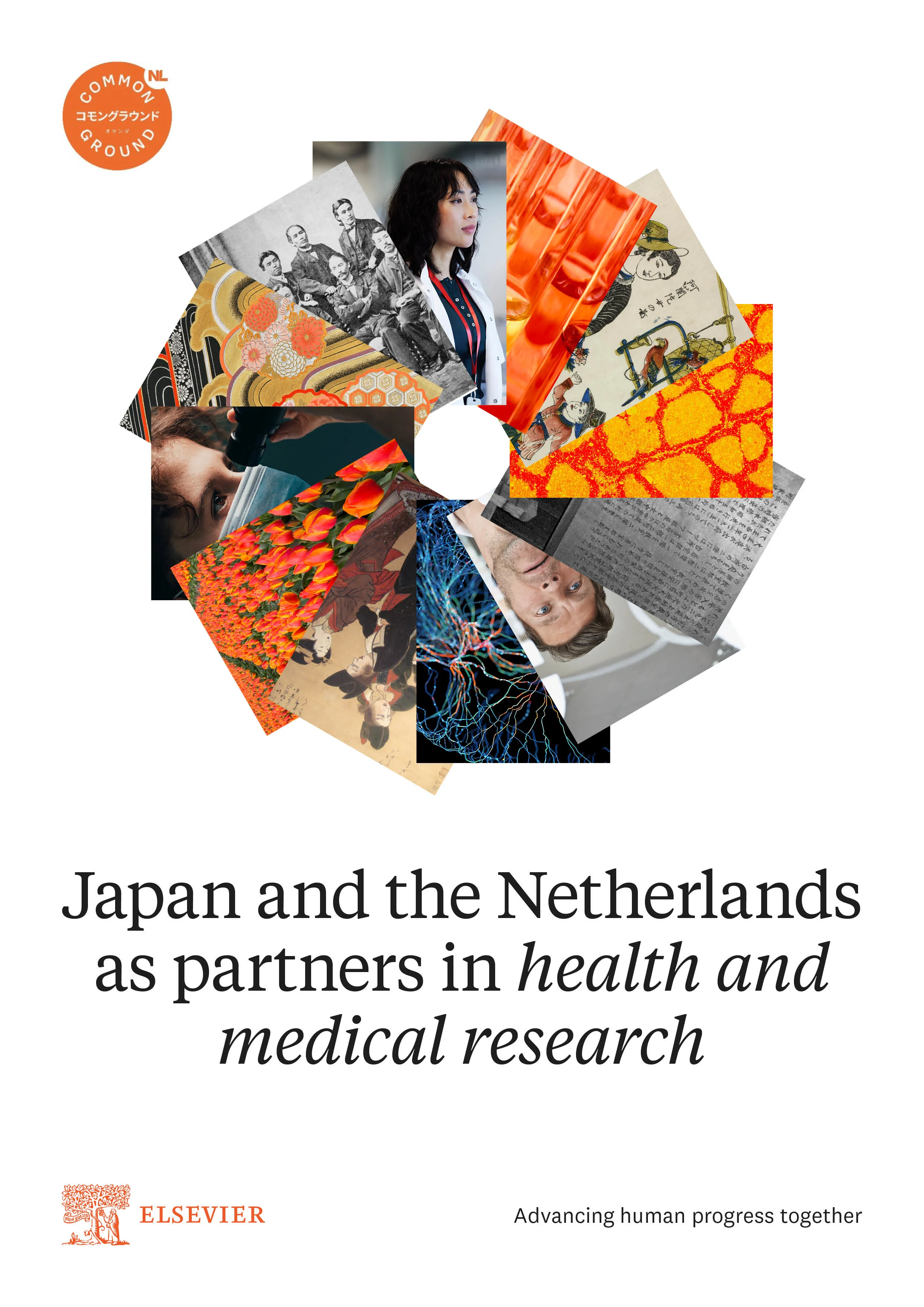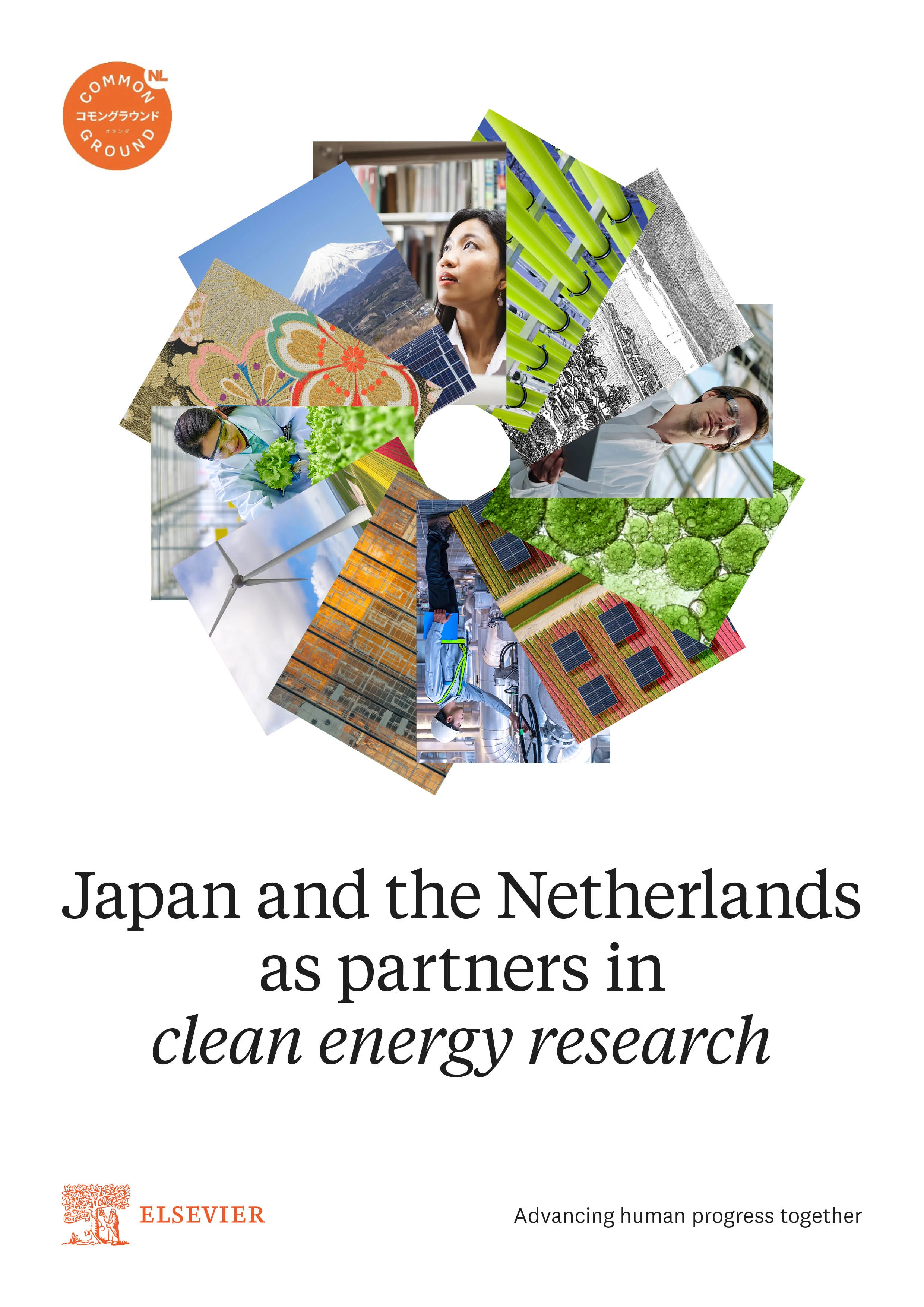Updated: The Netherlands and Japan as partners in scientific innovation, medicine, and clean energy
16 May 2025
By Michiel Kolman, PhD, Dr. Anders Karlsson

A new set of reports highlights the success of research collaboration between the Netherlands and Japan, showing its critical role in advancing innovation. The Netherlands and Japan as partners in science, technology and innovation Japan and the Netherlands as partners in health and medical research
Japan and the Netherlands as partners in clean energy research
With their collaboration extending back 425 years, the Netherlands and Japan have forged a strong relationship supported by academia, corporations and government. In 2025, the common ground between Japan and the Netherlands remains solid and holds great potential.
Here, we share the findings of a new Elsevier report examining the research and innovation landscapes of the two countries, particularly the impact of their collaboration.
Using Scopus, SciVal, Overton and PatentSight databases, we analyzed over 1.5 million articles between 2019 and 2024 by authors from the Netherlands and Japan and the patents and policy documents that cited them.

The Netherlands and Japan as Partners in Science, Technology and Innovation
Read the reportKey findings
Netherlands-Japan collaboration yields exceptional impact. Compared to the global average, the Netherlands-Japan collaboration delivers five times greater scientific impact, double the innovation impact, and nearly four times the influence on policy. Japan is the Netherlands’ most impactful scientific partner.
Strong public-private collaboration is a driver of success. A quarter of Japanese-Dutch research projects stem from public-private partnerships, greatly exceeding the global average (3%) and the individual rates of Japan and the Netherlands (both 7%). These projects deliver nearly 10 times the global average scientific impact.
High activity around strategic key technologies. Quantum technology and photonics are at the forefront of Japanese-Dutch collaboration. Joint activity is more than twice the world average for quantum and almost four times for photonics. Both countries have identified these key technology areas as critical to their future development.
These findings highlight key drivers of successful collaboration: aligned research interests, complementary research and innovation capabilities, and robust corporate-academic collaborations.
Timely insights for policymakers
The Netherlands-Japan Report provides powerful evidence that the strategic partnership between the Netherlands and Japan is a driver of significant progress in both countries. It also offers valuable guidance for policymakers, academic leaders and research funders aiming to boost competitiveness and shape international research strategies amid geopolitical uncertainty.
The report is part of Elsevier’s contribution to the Dutch pavilion at Expo 2025 Osaka.
Opportunities to increase the scale of collaboration and target other key technologies
Despite strong impact, the volume of collaboration is modest. Japan ranks 16th among the Netherlands’ top research partners, accounting for just 4% of joint work. Expanding ties — especially in semiconductors, robotics and battery technologies, where Japan is particularly active — would present significant growth potential.
Japan and the Netherlands as partners in health and medical research – successful collaboration across common ground
Following the study of Dutch-Japanese collaboration across all sciences, as noted above, we have issued a specialized report focusing on the bilateral partnership in health and medical research. In summary, collaborative performance in medical science surpasses that of all sciences across every metric.
The analysis shows that Dutch-Japanese collaboration in medical science achieves a Field-Weighted Citation Impact (FWCI) of 7, reflecting academic impact seven times the world average, compared to an FWCI of 5 across all sciences. Corporate involvement is marked by strong international partnerships and a significant presence of academic-corporate alliances, which account for 29% of joint medical research output, compared to 23% for all sciences. These alliances exhibit an FWCI of 12.5, underscoring extraordinary impact on innovation. Additionally, medical science collaboration demonstrates an innovation impact three times the world average (twice the world average for all sciences) and a policy impact four times the world average (2.5 times for all sciences).
The partnership’s focus on regenerative medicine and digital health highlights how the two countries leverage their distinct strengths to advance cutting-edge fields. While joint activity in regenerative medicine remains below the global average, with a Relative Activity Index (RAI) of about 0.6, the FWCI of 8.8 underscores the exceptional quality and influence of this research. In digital health, the collaboration performs above average (RAI about 1.25), integrating advances in artificial intelligence, telemedicine and robotics. Japan’s leadership in stem cell biology and tissue engineering complements the Netherlands’ expertise in clinical application and digital technologies, creating a synergistic effect that drives high-impact outcomes.

Japan and the Netherlands as partners in health and medical research
Read the reportJapan and the Netherlands as partners in clean energy research
The third and final report on the Japanese-Dutch research collaboration focuses on clean energy research, the science crucial to achieve a world powered by sustainable energy. The analysis explores clean energy through the lens of Net Zero research, where Net Zero represents the balance between greenhouse gases emitted and those removed from the atmosphere, a critical target to limit global warming and its devastating effects. Clean - Net Zero - energy research plays a pivotal role in this transition, driving innovation toward a sustainable future. When exploring Net Zero technologies the scholarly quality of collaborative research between Japan and the Netherlands jumps out: 3.5 times the world average. However, despite this high impact, the overall activity level for joint Net Zero research remains modest, at approximately half the world's average.
Both Japan and the Netherlands show high international collaboration for Net Zero research, more than twice and three times the world average respectively, highlighting a strong commitment to global partnership. For Japan, China emerges as its top collaborator, while for the Netherlands, Germany and the UK are key partners. Academic-corporate collaboration in joint Japan-Netherlands Net Zero research is remarkably high: more than five times the Net Zero world average, with key global players such as Toyota R&D, Hitachi, Mitsubishi Electric, Toshiba, Shell and TenneT. The joint Net Zero research also has high innovation potential towards impact as measured by research citations in patents: significantly higher than the innovation impact of Japanese or Dutch research.
We also analyzed research into specific clean energy areas and looked at the relative activity level and found that Japan is significantly more active in battery technologies research, while the Netherlands shows a much higher activity level in wind energy. Both countries are quite active in nuclear energy research, well above the world’s average. These distinct yet complementary strengths in nuclear, battery, and wind research represent clear and promising opportunities for future collaboration.
In summary, the Japan-Netherlands partnership in Net Zero energy research is a strategic alliance built on complementary and common strengths. The collaboration is marked by high academic excellence and robust innovation outputs, driven by extended multinational networks and strong ties between academia and industry. By leveraging their unique national strengths, this alliance is well-positioned to accelerate the much-needed clean energy transition.

Japan and the Netherlands as partners in clean energy research
Japan and the Netherlands as partners in clean energy researchNow that all three reports have been finalized and published it is a good moment to reflect on the common findings across all three. We see high impact of the Japanese – Dutch collaboration, whether that is for research across all disciplines, in the areas of medicine or clean energy. Impact is high on science, innovation and policy. There is a focus on strategic and future-oriented technologies such as quantum technology, photonics, regenerative medicine, digital health, and clean energy (e.g., wind, batteries, nuclear, and carbon removal technologies).
Public-private and academic-industrial partnerships play a crucial role in the collaborative research with notably high levels in health sciences and clean energy partnerships. Strong multinational networks underpin successful research and innovation, with extensive international cooperation, where Japan and the Netherlands collaborate with other major countries (e.g., US, China, Germany and UK).
Expo 2025 Osaka
From April 13 to October 13, Japan is hosting Expo 2025 Osaka, Kansai, Japan — with 160 participating nations and global organizations and an expected 28 million visitors. The Netherlands’ pavilion is fully circular, built according to the principles of the circular economy and easy to disassemble for reuse. It explores the country’s relationship with water and proposes that nations meet on “Common Ground” to solve today’s global challenges. As sponsor to the Netherlands pavilion, Elsevier created this report to support the Netherlands Ministry of Foreign Affairs’ trade missions to the Expo.
Contributors

Michiel Kolman, PhD
Senior VP, Research Networks, and Academic Ambassador
Elsevier
Read more about Michiel Kolman, PhD
Dr. Anders Karlsson
Vice President, Global Strategic Networks (Asia-Pacific)
Elsevier
Read more about Dr. Anders Karlsson